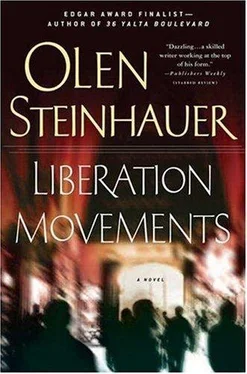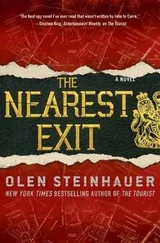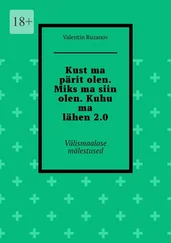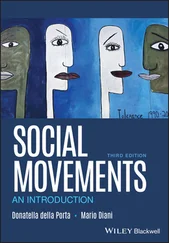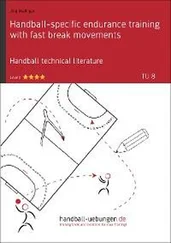Olen Steinhauer - Liberation movements
Здесь есть возможность читать онлайн «Olen Steinhauer - Liberation movements» весь текст электронной книги совершенно бесплатно (целиком полную версию без сокращений). В некоторых случаях можно слушать аудио, скачать через торрент в формате fb2 и присутствует краткое содержание. Жанр: Политический детектив, на английском языке. Описание произведения, (предисловие) а так же отзывы посетителей доступны на портале библиотеки ЛибКат.
- Название:Liberation movements
- Автор:
- Жанр:
- Год:неизвестен
- ISBN:нет данных
- Рейтинг книги:5 / 5. Голосов: 1
-
Избранное:Добавить в избранное
- Отзывы:
-
Ваша оценка:
- 100
- 1
- 2
- 3
- 4
- 5
Liberation movements: краткое содержание, описание и аннотация
Предлагаем к чтению аннотацию, описание, краткое содержание или предисловие (зависит от того, что написал сам автор книги «Liberation movements»). Если вы не нашли необходимую информацию о книге — напишите в комментариях, мы постараемся отыскать её.
Liberation movements — читать онлайн бесплатно полную книгу (весь текст) целиком
Ниже представлен текст книги, разбитый по страницам. Система сохранения места последней прочитанной страницы, позволяет с удобством читать онлайн бесплатно книгу «Liberation movements», без необходимости каждый раз заново искать на чём Вы остановились. Поставьте закладку, и сможете в любой момент перейти на страницу, на которой закончили чтение.
Интервал:
Закладка:
“You’re not a spy, are you?”
Peter looked up as Daniel squatted beside him. “What?”
The philologist scratched his beard. “You sit here and listen to everything we say, as if you’re collecting information. Where did you resist?”
“I tried to get out. To Austria.”
“But you didn’t make it?”
“The soldiers caught up with me.”
Daniel glanced back at the others in the cell. “Did they get anything out of you? Names?”
“I didn’t have any names to give.”
“So you’re one of us?” He grinned. “A hooligan?”
“I marched,” said Peter. “I signed petitions. I suppose that makes me a hooligan, too.”
Libarid
It is eleven at night, Tuesday the twenty-second of April, 1975, when Libarid Terzian climbs out of the Trabant in front of Departures. His wife, Zara, and Vahe, his five-year-old boy, help him with the sticky trunk. It’s far past his son’s bedtime, but he lets Vahe, struggling and tottering but proud, carry his small suitcase to the curb while he kisses Zara. She’s teary again, as if she knows something she shouldn’t, and for an instant Libarid fears she does know.
“You’re going to be exhausted when you land,” she says, sniffing.
“Can always depend on the People’s Militia choosing the cheapest and most inconvenient transportation.”
She gives him a wet smile. No, she knows nothing-this is just the weepiness you grow accustomed to when your wife is a traditional Armenian who’s never believed she could be European.
So he kisses her, gives Vahe a hug and a pat on the back. “You’re the man of the house now.” Vahe likes this at first, but suddenly it seems to frighten him, and he clutches his mother’s hand. That quick movement hurts Libarid somewhere in his throat. He wishes he could bring the boy along, but that’s just not possible. Not yet.
He clears his throat and waves briefly as they drive off into the blackness, south toward the Capital. Once they’re out of sight, he takes a packet of Carpa i from his pocket and lights a cigarette. Zara hates it when he smokes.
He doesn’t yet feel the freedom but knows it will come, clearing away this melancholy. On the plane, or maybe not until he’s lost in the winding back streets of Istanbul, finally loosed from the chains of matrimony.
A taxi pulls up to the curb, and from it emerge a man and a woman. The man is very large, nearly bald, with a small, flat boxer’s nose, like the most dangerous lumpenprole he’s ever seen. But it’s the young woman Libarid has trouble turning away from. Her features are very delicate, and the combination of long black hair with pale blue eyes-he can’t stop staring as her companion takes their bags from the trunk and pays the driver.
Libarid steps on his cigarette, opens the glass door to the airport, and smiles. She smiles back as she enters. Her big companion, whose flat face is riveted by acne scars, only frowns.
A sign over the Turkish Airlines desk announces that check-in for the 1:00 A.M. flight to Istanbul isn’t until midnight. He has an hour, so he carries his bag to the gift shop, where behind a counter a sixteen-year-old girl sits on a stool, focused on the crossword puzzle in her lap.
“Excuse me,” says Libarid.
She says to the crossword, “Yeah?”
“Writing paper?”
Without looking up she reaches to the wall of shelves behind her and grabs a package of fifty sheets, then places it on the counter. “Fifty-four korona.”
“A pen, too,” he says. “And an envelope.”
She sighs and finally looks at him. She drops from her stool and climbs a wooden stepladder to canisters of ballpoint pens. She peers down. “How many?”
“Two pens, one envelope.” Then: “No. Two envelopes. I might mess up one.”
The girl is not amused by his indecision.
Libarid finds a seat among rows of other travelers in the waiting area. By a high window facing the street, Orthodox Jews-a family-stretch out in silence on their bags, the children dozing; in other chairs sit more crossword players. But what he notices is two rows ahead of him-the beautiful pale-eyed woman and her companion. They don’t speak to each other, but the big man sometimes looks around, as if he’s protecting her.
Libarid’s procrastinating, and he knows it.
So he takes out the writing paper, uncaps the pen, and writes, My dearest Zara,
No, that’s too misleading. He flips to a fresh sheet. Dear Zara,
He stares at that, repeating the two words until they become a stream of nonsensical syllables. Then he places another clean sheet on top. Zara-
And isn’t sure how to proceed from there.
Two rows up, the woman touches her companion’s knee, points to a far corner, and speaks. She must be whispering, because Libarid can’t hear a thing. The big man walks with her to the tiled corridor that leads past pay phones to the bathrooms.
Libarid takes the two-toned pamphlet from his bag: INTERPOL INTERNATIONAL CONFERENCE ON CRIME AND COOPERATION IN ISTANBUL, 23-26
April 1975. Emil Brod-Libarid still can’t bring himself to call his younger friend “chief”-explained his understanding of the conference. “Brano feels the invitation’s largely to seduce us in the East to share more of our resources.”
“Why me?”
“You’ve got a wife and child. You’re the safest bet.”
“I see.”
Emil winked at him. “But as far as you’re concerned, it’s a vacation interrupted now and then by dull lectures.”
He was right. Out of four days of presentations, there’s only one that provokes any interest from him: a Swedish delegate, Roland Adelsvard, on “The Encouragement and Harboring of Terrorists by Various States.” Otherwise, it will be a long four days.
Leading, though, to a lifetime of freedom.
When he looks up again the woman is at the end of the tiled corridor, at the pay phones. She speaks into a receiver, nodding, and then places a hand on the wall for support. As if the conversation is very emotional. Then she hangs up, takes a breath, and dials a second number. This call is without emotion, and brief. Once she’s done she turns quickly and smiles just as the big man appears, hiking up his pants. He guides her back to their seats, a hand on her elbow.
At midnight, Libarid puts the letter, which hasn’t progressed beyond the first word, into his bag and joins a long line at the Turkish Air counter. Halfway up are the woman and her companion. Perhaps because she feels him staring, she turns around fully and settles her pale eyes on him.
He swallows.
She smiles.
Peter
1968
Peter and four other students were released without comment on the twenty-eighth of August, 1968, and for a moment the five of them paused, sweating under the low-lying sun in front of the sooty yellow facade of Bartolom jska 9, which had once been a convent and was now a prison. “Does anyone have a cigarette?” Peter asked as he took off the dirty old pinstriped jacket he’d worn for the last week.
A fat young man started to rummage through his pockets.
“Not here,” said Daniel, and he led them down the street, then around the corner to Narodni, where they walked in silence to the Vltava. Halfway across Legions’ Bridge, Sharpshooters’ Island was so thick with trees that, from a distance, it looked to Peter as if a forest were growing out of the water. They stopped at the beginning of the bridge, across from the Cafe Slavia, and the five of them shared three cigarettes, staring at the sluggish Vltava and, upriver, the Charles Bridge and its rows of statues.
“What now?” said the fat one.
“I’m going to find those partisans,” said a red-faced student who had, in the jail cell, seemed the most frightened.
Читать дальшеИнтервал:
Закладка:
Похожие книги на «Liberation movements»
Представляем Вашему вниманию похожие книги на «Liberation movements» списком для выбора. Мы отобрали схожую по названию и смыслу литературу в надежде предоставить читателям больше вариантов отыскать новые, интересные, ещё непрочитанные произведения.
Обсуждение, отзывы о книге «Liberation movements» и просто собственные мнения читателей. Оставьте ваши комментарии, напишите, что Вы думаете о произведении, его смысле или главных героях. Укажите что конкретно понравилось, а что нет, и почему Вы так считаете.
